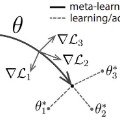Recent work has shown the efficiency of deep learning models such as Fully Convolutional Networks (FCN) or Recurrent Neural Networks (RNN) to deal with Time Series Regression (TSR) problems. These models sometimes need a lot of data to be able to generalize, yet the time series are sometimes not long enough to be able to learn patterns. Therefore, it is important to make use of information across time series to improve learning. In this paper, we will explore the idea of using meta-learning for quickly adapting model parameters to new short-history time series by modifying the original idea of Model Agnostic Meta-Learning (MAML) \cite{finn2017model}. Moreover, based on prior work on multimodal MAML \cite{vuorio2019multimodal}, we propose a method for conditioning parameters of the model through an auxiliary network that encodes global information of the time series to extract meta-features. Finally, we apply the data to time series of different domains, such as pollution measurements, heart-rate sensors, and electrical battery data. We show empirically that our proposed meta-learning method learns TSR with few data fast and outperforms the baselines in 9 of 12 experiments.
翻译:最近的工作显示了深层学习模型的效率,如全面进化网络(FCN)或经常性神经网络(RNNN)等深层学习模型处理时间序列回归(TSR)问题的效率。这些模型有时需要大量数据才能概括化,但时间序列有时不够长,无法学习模式。因此,必须利用跨时间序列的信息来改进学习。在本文件中,我们将探索如何利用元学习来迅速将模型参数适应于新的短历史时间序列,办法是修改模型Agnostic Meta-Learning(MAML)的最初想法\cite{finn2017 model}。此外,根据MAMLAML 的以往工作,我们提出了一个调整模型参数的方法,即通过一个辅助网络将时间序列的全球信息编码来提取元特征。最后,我们将这些数据应用到不同领域的时间序列,例如污染测量、心率传感器和电荷电池数据等。此外,我们根据经验,根据关于MAML \ vvorio 2019 Multimodmodmodal 的工作,我们提出了一种调整模型参数的方法来调整模型参数,通过一个辅助网络来将模型的模型的模型,以学习方法来提取元数据。





